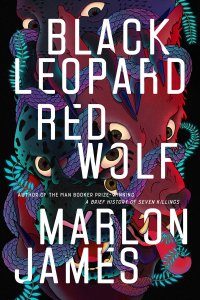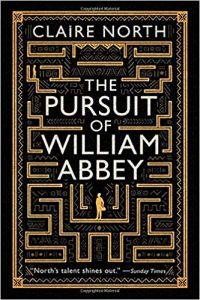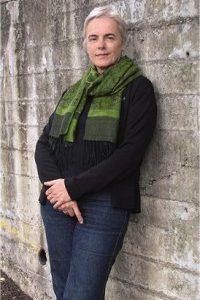2019 by Tim Pratt

Most years I read a fair bit of science fiction and fantasy, but the majority of my pleasure reading tends to be mystery and crime (I don’t write in those genres, so I can enjoy them without that otherwise inevitable layer of analysis). This year, though, I’m on an award jury covering speculative fiction, and as a result, I’ve read more widely and deeply in my home field than I have in several years. It’s not an easy year to be a judge: there’s just too much excellent work out there.
I’m always on the lookout for promising first novels, and there were a couple that really wowed me. The Ten Thousand Doors of January by recent short story Hugo Award winner Alix Harrow could have been designed in a lab to delight me: it’s a historical fantasy about mysterious books and magical doors, and a young woman who discovers that both the world and her heritage are far stranger than she ever imagined. Gideon the Ninth by Tamsyn Muir deserves all the buzz it’s getting: it’s a fun, fast, snarky, compulsively readable planetary adventure set in a galactic empire where necromancers and their cavaliers (sword-wielding bodyguard/servants/confidantes) are pit against one another in a race to win the emperor’s favor. Gideon herself is a delight on every page. The Luminous Dead by Caitlin Starling is a claustrophobic psychological thriller set deep underground on an alien planet, with a spelunker heroine struggling with the threats from her environment, her own tragic backstory, and her relationship with the enigmatic handler on the radio who is her only connection to the surface world.
 There were a couple of books that aren’t first novels, but mark significant forays into new territory for their authors: Ninth House is Leigh Bardugo’s first novel for adults (after her wildly successful secondary-world fantasy YA Grishaverse books), and it’s a delight through and through. Alex Stern has a dark past, the ability to see ghosts, and a scholarship to Yale that’s contingent on her service to Lethe House, the organization that makes sure the eight magical secret societies (Skull and Bones, Scroll and Key, you get the idea) don’t accidentally unleash demons or murder townsfolk. Even in a world of secrets, Alex has more secrets than most, and the book is twisty, affecting, and weird. Ann Leckie, justly famed for her Imperial Radch science fiction series, moves into fantasy with standalone The Raven Tower, deftly combining weird magic, captive gods, Shakespearean plotting, and a mysterious narrator whose ultimate identity is one of the best big reveals I’ve read in years.
There were a couple of books that aren’t first novels, but mark significant forays into new territory for their authors: Ninth House is Leigh Bardugo’s first novel for adults (after her wildly successful secondary-world fantasy YA Grishaverse books), and it’s a delight through and through. Alex Stern has a dark past, the ability to see ghosts, and a scholarship to Yale that’s contingent on her service to Lethe House, the organization that makes sure the eight magical secret societies (Skull and Bones, Scroll and Key, you get the idea) don’t accidentally unleash demons or murder townsfolk. Even in a world of secrets, Alex has more secrets than most, and the book is twisty, affecting, and weird. Ann Leckie, justly famed for her Imperial Radch science fiction series, moves into fantasy with standalone The Raven Tower, deftly combining weird magic, captive gods, Shakespearean plotting, and a mysterious narrator whose ultimate identity is one of the best big reveals I’ve read in years.
 I read books by a couple of established literary writers I’d never experienced before. Black Leopard, Red Wolf by Marlon James was hyped as “An African Game of Thrones,” but it’s actually an African fantasy noir, complete with a detective protagonist (Seeker, who can sniff out anyone, eventually) struggling to make his way through a treacherous world full of systems indifferent to his suffering, surrounded by a cast of characters with shifting or hidden loyalties. It’s unlike any fantasy I’ve ever read before, drawing on African mythic traditions, twisting the conventions of the quest narrative, and delivering one emotional gut punch after another. It’s ambitious and powerful, and the Dark Star trilogy is shaping up to be a major work. Gingerbread by Helen Oyeyumi is an altogether lighter confection, a literary novel and family drama with an unconventional structure about immigrants from a (possibly imaginary) island nation with magical elements that creep up on you. Despite many outlandish plot elements, the characters are so real you could forget they’re even fictional.
I read books by a couple of established literary writers I’d never experienced before. Black Leopard, Red Wolf by Marlon James was hyped as “An African Game of Thrones,” but it’s actually an African fantasy noir, complete with a detective protagonist (Seeker, who can sniff out anyone, eventually) struggling to make his way through a treacherous world full of systems indifferent to his suffering, surrounded by a cast of characters with shifting or hidden loyalties. It’s unlike any fantasy I’ve ever read before, drawing on African mythic traditions, twisting the conventions of the quest narrative, and delivering one emotional gut punch after another. It’s ambitious and powerful, and the Dark Star trilogy is shaping up to be a major work. Gingerbread by Helen Oyeyumi is an altogether lighter confection, a literary novel and family drama with an unconventional structure about immigrants from a (possibly imaginary) island nation with magical elements that creep up on you. Despite many outlandish plot elements, the characters are so real you could forget they’re even fictional.
Other novels I greatly enjoyed include Middlegame by Seanan Maguire, the best book of hers I’ve read yet, about siblings endowed with great power (one has mastery of mathematics, and the other of language) who lose and find one another across their lives as malevolent alchemists attempt to manipulate them to their own ends. It’s everything I love about contemporary fantasy. The Pursuit of William Abbey is my favorite book by Claire North, who always has amazing ideas and top-notch writing but sometimes creates characters who leave me cold. Not so in this relentless and dark historical fantasy set at the turn of the 20th century, about an English doctor who is cursed to be pursued by the shadow of a boy he saw murdered in Africa. If he’s caught, the shadow will kill whomever Abbey loves most, but when the shadow is close, Abbey can see the truth in anyone’s heart… which makes him a useful spy, and target for various imperial interests. Wanderers by Chuck Wendig is a sprawling pre-, peri-, and post-apocalyptic novel set in a world where people begin sleepwalking west, and die if anyone tries to stop their relentless motion; the big cast, high stakes, and speculative invention makes it a treat for fans of books like Stephen King’s The Stand.
 Moving on from novels, the best novella I read (and one of my favorite books of the year, period) was This Is How You Lose the Time War by Amal El-Mohtar & Max Gladstone. I’ve read plenty by each of them with pleasure over the years, but in combination they created something altogether new: a romantic, heartbreaking, harrowing epistolary romance between rival agents in a time-and-dimension-spanning conflict between two great empires, with enough big bold SF ideas to fill a trilogy in other hands. It’s been a great year for collections, too, with some clear standouts. Wounds by Nathan Ballingrud is a horror collection, but it’s super weird horror, with thematically linked pieces about the dark edges of human experience, and frequent intrusions from and forays into regions of Hell; every story is a surprise, but the real standout is novella “The Visible Filth” about a New Orleans bartender’s disintegration and descent into darkness (it was made into a good film called Wounds last year, hence the title). Exhalation by Ted Chiang is a landmark work, just as his first collection Stories of Your Life was 17 years ago. Every story here is a gem, though of course I have my favorites, including the title piece, and “The Great Silence” (who would have thought a story about parrots could make me tear up at the end?), and the short, sharp shock of “What’s expected of us”. Chiang is one of our greatest living short story writers (I’d only put George Saunders and Kelly Link in the same class) and any book by him is an event.
Moving on from novels, the best novella I read (and one of my favorite books of the year, period) was This Is How You Lose the Time War by Amal El-Mohtar & Max Gladstone. I’ve read plenty by each of them with pleasure over the years, but in combination they created something altogether new: a romantic, heartbreaking, harrowing epistolary romance between rival agents in a time-and-dimension-spanning conflict between two great empires, with enough big bold SF ideas to fill a trilogy in other hands. It’s been a great year for collections, too, with some clear standouts. Wounds by Nathan Ballingrud is a horror collection, but it’s super weird horror, with thematically linked pieces about the dark edges of human experience, and frequent intrusions from and forays into regions of Hell; every story is a surprise, but the real standout is novella “The Visible Filth” about a New Orleans bartender’s disintegration and descent into darkness (it was made into a good film called Wounds last year, hence the title). Exhalation by Ted Chiang is a landmark work, just as his first collection Stories of Your Life was 17 years ago. Every story here is a gem, though of course I have my favorites, including the title piece, and “The Great Silence” (who would have thought a story about parrots could make me tear up at the end?), and the short, sharp shock of “What’s expected of us”. Chiang is one of our greatest living short story writers (I’d only put George Saunders and Kelly Link in the same class) and any book by him is an event.
In addition to being a senior editor and occasional book reviewer at Locus, Tim Pratt is the author of over 20 novels, most recently space opera The Wrong Stars, first in the Axiom series. His short stories have appeared in The Best American Short Stories, The Year’s Best Fantasy, The Mammoth Book of Best New Horror, and other nice places. He’s a Hugo Award winner for short fiction, and has been a finalist for World Fantasy, Sturgeon, Stoker, Mythopoeic, and Nebula Awards, among others. He lives in Berkeley CA with his family. Every month he writes a new story for his Patreon supporters at www.patreon.com/timpratt
This and more like it in the February 2020 issue of Locus.
 While you are here, please take a moment to support Locus with a one-time or recurring donation. We rely on reader donations to keep the magazine and site going, and would like to keep the site paywall free, but WE NEED YOUR FINANCIAL SUPPORT to continue quality coverage of the science fiction and fantasy field.
While you are here, please take a moment to support Locus with a one-time or recurring donation. We rely on reader donations to keep the magazine and site going, and would like to keep the site paywall free, but WE NEED YOUR FINANCIAL SUPPORT to continue quality coverage of the science fiction and fantasy field.







